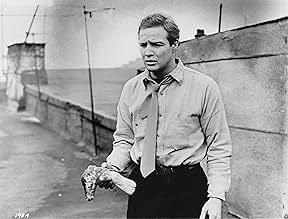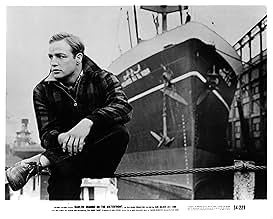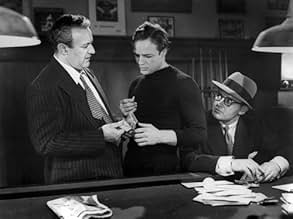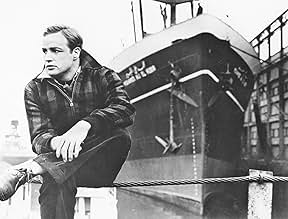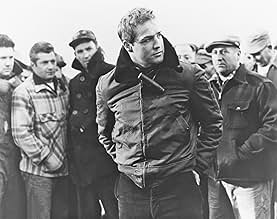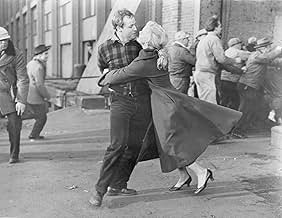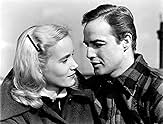Terry Malloy, scaricatore di porto ed ex pugile, è il fratello di un boss che controlla il sindacato dei portuali di New York. Una faticosa crisi di coscienza lo spinge però a testimoniare c... Leggi tuttoTerry Malloy, scaricatore di porto ed ex pugile, è il fratello di un boss che controlla il sindacato dei portuali di New York. Una faticosa crisi di coscienza lo spinge però a testimoniare contro la sua corruzione criminale...Terry Malloy, scaricatore di porto ed ex pugile, è il fratello di un boss che controlla il sindacato dei portuali di New York. Una faticosa crisi di coscienza lo spinge però a testimoniare contro la sua corruzione criminale...
- Regia
- Sceneggiatura
- Star
- Vincitore di 8 Oscar
- 30 vittorie e 11 candidature totali
- 'Pop' Doyle
- (as John Hamilton)
- Gillette
- (non citato nei titoli originali)
- Sidney
- (non citato nei titoli originali)
Riepilogo
Recensioni in evidenza
The story here concerns Terry Malloy, a New York shipyard worker who finds his conscience bothering him when one of his friends is murdered. Terry at first is a tough guy with a grim outlook ("you know my philosophy on life, give it to 'em before they give to you") who despite his inner turmoil refuses to confess anything to the Police as it would make him a "rat." However, the arrival of Malden's headstrong Preacher and the victim's innocent sister Edie (Eva Marie Saint in her debut appearance) throws his deaf and dumb world into chaos. Soon, Terry finds himself falling for Edie and the Preacher's words hit home, leaving the angry young dockworker to question what's really right. The mob meanwhile aren't too happy about Terry's UNHEALTHY RELATIONSHIP and begin to pile on the pressure, especially his older brother Charlie who's torn between loyalty to his boss and looking out for his younger sibling. Before anyone can put a lid on things, the dockyard becomes a very tense place to be.
Brando of course puts his heart and soul into his performance. Terry by his very nature isn't one to carry his heart on his sleeve and so the great Method Actor is left to convey his turmoil through body language alone. It is a testament to how good he is that you can tell exactly what Terry is feeling even though he hardly ever expresses it verbally. Instead his shoulders hunch with resigned indignation and his eyes spark with anger, Brando playing the part so well he more or less disappears into the character completely. While he may have taken a lot of the credit however, he is far from the only strong presence in the film as Karl Malden's rock hard Preacher is just as compelling, his depiction of the dignified man of Christ who isn't afraid to drink beer and smoke cigarettes with the Wharf rats being a refreshingly positive portrayal of a Catholic leader. Eva Marie Saint meanwhile puts in a convincing portrayal of Edie, but she is hamstrung a little by some old fashioned writing. Her pursuit of her brother's murderers give her some powerful moments but there are a couple of instances where it becomes all too clear that the part was written by a man. However, she still gives us one of the most touching moments in the film, a confrontation with Terry where most of their chat is disrupted by a tug horn that is achingly sad despite the absence of dialogue.
Acting is only one half of the equation of course and needless to say, the story remains constantly gripping. The murder that opens the film leaves an instant grip on the viewer's attention and as Terry spirals further into an intricate web of half truths, things get incredibly dark. The New York tenement blocks that tower over the proceedings provide an imposing sense of claustrophobia while the rooftops are a smoke laden jungle of chimney stacks and TV aerials. However, if you look closely it becomes apparent that the crew still had some fun with the material and there is some subtle humour to be had - a wedding party degenerating into a brawl and a bar full of panicked customers emptying into the streets followed by a shot of one isolated individual desperately jumping into the bathroom.
All in all therefore, On The Waterfront is a film that is thoroughly deserving of its reputation. Brando excels in his role and heads up a highly talented cast giving it their all. Most of all though, it's an engaging and captivating story of urban paranoia, filled with tough guys spitting out slang in barking New York accents. Think you're a big shot, do ya? Huh? Well do us all a favour and check this one out. Ah enough a youse guys, ged outta here.
It made a moviefan of me for life. I remember the effect of "On the Waterfront", as I remember thinking about Terry Malloy in that final scene, "Wow, that guy's got guts! I wish I could be like him." Being just a typical Midwestern teen, I didn't know who Marlon Brando was, but I just was fascinated by this life of these good and bad people, on the tops of buildings and in the cold, wet streets and alleys of this far-away place near the waterfront.
Now, every time I watch it, years later, I still love it. Yes, there is definitely an attempt to make Terry into a Christ-figure at the end. That's no coincidence that he stumbles from having been beaten to a pulp, to walk and carry a hook on his shoulders, to lead others to a better life. (In the book by Budd Schulberg, by the way, Terry disappears after testifying and what is thought to be his body is found floating in a barrel of lime. But he has become a legend on the waterfront.) I love the powerful Elmer Bernstein score (glaring for our present tastes, but back then, exactly what people expected to hear during a drama -- you've got to wonder what a future generation will say about the constant replays of fairly irrelevant pop and rap songs as themes during most movies today, dramatic or comedy).
And being raised in a Catholic home, I found Father Barry to be a great dramatic figure, one of the only times I saw a priest portrayed as a gritty, brave, heroic person, not afraid to mix it up with the common folks in the parish. He smoked, drank and slugged it out. And he was not afraid to die for the right reason. Folks, that's true Christianity at work. And that's powerful.
A classic. A must-see. 10/10
I haven't long completed Target, The Corruptors, and the wonderful algorithms suggested this film, what a great suggestion. Very much a story of people suffering at the hands of The Mob, and someone forced to bracelet make a stand.
This film is very gritty, very well paced, and boy you get a sense of the poverty and desperation of those men.
Marlon Brando makes this film so incredibly watchable, his performance is nothing short of captivating, he exudes masculinity, anger, rage, conflict and love. He definitely appears haunted in this movie, he has a look in his eyes.
9/10.
Unquestionably, the strength of the film is the acting. Brando's performance in particular is one for the ages. He won his first Oscar for this role and Eva Marie Saint also garnered an Oscar in her introductory film role. On top of that Karl Malden, Lee J. Cobb & Rod Steiger all earned Best Supporting Actor nominations. These accolades give an idea of the level of talent on display here.
Kazan's direction is well done as he strives for a gritty, realistic look. Shooting on location was an important part of that. Leonard Bernstein's score, on the other hand, is often overbearing. There's nothing wrong with the music itself, only the prominence of it.
The main area in which I feel the film doesn't quite deliver is the story. The film does a fine job of exploring the characters but I find that the underlying storyline doesn't really work for me. The main premise is a good one but after the initial confrontation I began to lose interest. The self-consciously 'inspiring' ending doesn't help, either.
All things considered, I give the film high marks for the excellent acting and direction which, unfortunately, are in service of a merely average story.
This is an interesting and thought-provoking film with attractive plot by screenwriter Budd Schulberg , containing intense drama with pungent lines , emotion , wonderful performances , memorable climax , magnificent direction and classic musical score by maestro Leonard Berstein . For this brooding film and highy charged throughout story writer Budd Schulberg took the idea from newspapers , as he started with an expose series written for The New York Sun by reporter Malcolm Johnson , the articles won him a Pulitzer Prize and were reinforced by the 1948 murder of a New York dock hiring boss which woke America to the killings , graft and extortion that were endemic on the New York waterfront . Marvelous acting by entire casting . Marlon Brando is perfect as stevedore who faces the thorny dilemma of whether or not to become himself into an unfortunate informer . The taxicab scene , one of the most known scenes in the cinema, in which Brando began to improvise some dialogue , while surprising Rod Steiger listened and Kazan simply stood back and let the two actors direct themselves . Along with first-rate main cast : Brando , Steiger , Eva Maria Saint , appearing here and there great secondaries giving nice interpretations , such as : Lee J. Cobb , Leif Erickson , Michel V. Gazzo, Pat Henning , James Westerfield , Martin Balsam , Pat Hingle , Nehemiah Persoff, among others . Being film debuts of Michael V. Gazzo, Pat Hingle, Martin Balsam, and Eva Marie Saint . The leading characters were based on real people: Terry Malloy was based on longshoreman and whistle-blower Anthony De Vincenzo ; Father Barry was based on waterfront priest John M. Corridan ; Johnny Friendly was based on mobster Albert Anastasia. On the Waterfront is widely known to be an act of expiation on the part of Elia Kazan for naming names to the House Committee on Un-American Activities (HUAC) during the Joseph McCarthy witch-hunts of the 1950s.
This trend-setting film has a gritty portrait of N. Y. waterfront and stand up well nowadays and resulted to be a huge financial hit , it is a winner all the way , as from a budget of just under $1 million, the film went on to gross ten times its production costs in its initial release. And winning eight Academy Awards , including : Best Picture , Direction (Elia Kazan) , Actor (Marlon Brando), special mention for Eva Maria Saint who gave a debut performance that won her the Best Supporting Actress Academy Award, Cinematography (cameraman Boris Kaufman) , Art Director (Richard Day) . The motion picturre was compellingly directed by Elia Kazan , and it seems to be a direct response to Miller's play The Crucible. In fact , Kazan intended it as a direct attack at his former close friend Arthur Miller who had been openly critical of Elia's actions . Rating : Very good , above average , and a real must see . Well worth watching .
Oscars Best Picture Winners, Ranked
Oscars Best Picture Winners, Ranked
Lo sapevi?
- QuizIn his biography of Elia Kazan, Richard Schickel describes how Kazan used a ploy to entice Marlon Brando to do the movie. He had Karl Malden direct a scene from the film with an up-and-coming fellow actor from the Actors Studio playing the Terry Malloy lead role. They figured the competitive Brando would not be eager to see such a major role handed to some new screen heartthrob. The ploy worked, especially since the competition had come in the form of a guy named Paul Newman.
- BlooperWhen Father Barry (Karl Malden) gets hit in the head with a beer can, he gets a cut on his forehead, which bleeds visibly in the scene. In subsequent scenes, there is no sign of the cut or of a bandage to show that he had been hurt.
- Citazioni
Charley Malloy: Look, kid, I... how much you weigh, son? When you weighed 168 pounds you were beautiful. You coulda been another Billy Conn, and that skunk we got you for a manager, he brought you along too fast.
Terry Malloy: It wasn't him, Charley, it was you. Remember that night in the Garden you came down to my dressing room and you said, "Kid, this ain't your night. We're going for the price on Wilson." You remember that? "This ain't your night"! My night! I coulda taken Wilson apart! So what happens? He gets the title shot outdoors on the ballpark and what do I get? A one-way ticket to Palookaville! You was my brother, Charley, you shoulda looked out for me a little bit. You shoulda taken care of me just a little bit so I wouldn't have to take them dives for the short-end money.
Charley Malloy: Oh, I had some bets down for you. You saw some money.
Terry Malloy: You don't understand. I coulda had class. I coulda been a contender. I coulda been somebody, instead of a bum, which is what I am, let's face it. It was you, Charley.
- Curiosità sui creditiOpening credits are shown over a bamboo-type mat background.
- Versioni alternativeCriterion Collection Blu-ray Disc release exhibits the film in 1.66:1, which is widely regarded to be the "correct" aspect ratio for the film. However, a second disc includes the film in 1.33:1 AND 1.85:1, so that viewers can watch the film in the different ratios.
- ConnessioniEdited into Un Américain nommé Kazan (2018)
I più visti
Dettagli
- Data di uscita
- Paese di origine
- Lingue
- Celebre anche come
- Nido de ratas
- Luoghi delle riprese
- Azienda produttrice
- Vedi altri crediti dell’azienda su IMDbPro
Botteghino
- Budget
- 910.000 USD (previsto)
- Lordo in tutto il mondo
- 3768 USD
- Tempo di esecuzione1 ora 48 minuti
- Colore
Contribuisci a questa pagina



